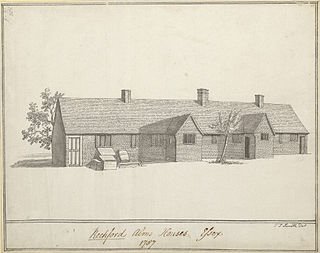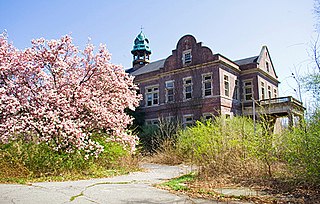History
The hospital was founded as the Sandlebridge Boarding School or Sandlebridge Colony when the Lancashire and Cheshire Society for the Permanent Care of the Feeble-Minded converted two houses in Sandlebridge in Cheshire for use as schools in 1908. [1] In 1933 the schools were renamed the Mary Dendy Homes in memory of Mary Dendy who had been the secretary (and later president) of the society. [1]
Dendy had been involved in agitation for the reform of provision for the "mentally sub-normal", and gave evidence to the Royal Commission looking into the issue, which produced the Radnor Report, leading to the Mental Deficiency Act of 1913. [2] She repeated in her evidence to the commission, [3] a view she had frequently expressed previously, [4] that the mentally subnormal and the mentally ill should be recognised as separate problems, requiring different approaches, and hence the mentally subnormal required separate facilities and institutions distinct from the traditional lunatic asylum: the Sandlebridge facility was the first permanent residential care home for mentally deficient children in the United Kingdom and thus an exemplar for this approach. [5]
The Mary Dendy Homes joined the National Health Service as the Mary Dendy Hospital in 1948 and it continued to accommodate mentally handicapped children until it closed in 1986. [1]

An almshouse was charitable housing provided to people in a particular community, especially during the medieval era. They were often targeted at the poor of a locality, at those from certain forms of previous employment, or their widows, and at elderly people who could no longer pay rent, and are generally maintained by a charity or the trustees of a bequest. Almshouses were originally formed as extensions of the church system and were later adapted by local officials and authorities.

Henry Herbert Goddard was a prominent American psychologist, eugenicist, and segregationist during the early 20th century. He is known especially for his 1912 work The Kallikak Family: A Study in the Heredity of Feeble-Mindedness, which he himself came to regard as flawed for its ahistoric depiction of the titular family, and for being the first to translate the Binet intelligence test into English in 1908 and distributing an estimated 22,000 copies of the translated test across the United States. He also introduced the term "moron" for clinical use.
The term feeble-minded was used from the late 19th century in Europe, the United States and Australasia for disorders later referred to as illnesses or deficiencies of the mind.

Pineland Farms is a 5,000-acre farm and recreational property in the eastern part of New Gloucester, Maine. It is partly on the site of the former Pineland Hospital and Training Center.

Great Warford is a village and civil parish in the unitary authority of Cheshire East and the ceremonial county of Cheshire, England.

Pennhurst State School and Hospital, originally known as the Eastern Pennsylvania State Institution for the Feeble-Minded and Epileptic was an institution for mentally and physically disabled individuals of Southeastern Pennsylvania located in Spring City. After 79 years of controversy, it closed on December 9, 1987.

The Rosewood Center was an institution for people with developmental disabilities located on Rosewood Lane in Owings Mills, Maryland.

The Fairview Training Center was a state-run facility for people with developmental disabilities in Salem, Oregon, United States. Fairview was established in 1907 as the State Institution for the Feeble-Minded. The hospital opened on December 1, 1908, with 39 patients transferred from the Oregon State Hospital for the Insane. Before its closure in 2000, Fairview was administered by the Oregon Department of Human Services (DHS). DHS continued to operate the Eastern Oregon State Hospital in Pendleton until October 31, 2009.
Compulsory sterilization in Canada has a documented history in the provinces of Alberta, Saskatchewan, and British Columbia. In 2017, sixty indigenous women in Saskatchewan sued the provincial government, claiming they had been forced to accept sterilization before seeing their newborn babies.
The Idiots Act 1886 was an act of Parliament of the United Kingdom. It was intended to give "... facilities for the care, education, and training of Idiots and Imbeciles".

The Virginia State Colony for the Epileptics and Feeble Minded was a state run institution for those considered to be “Feeble minded” or those with severe mental impairment. The colony opened in 1910 near Lynchburg, Virginia in Madison Heights with the goal of isolating those with mental disabilities and other qualities deemed unfit for reproduction away from society. The colony was the home of Carrie Buck, the subject of the landmark Supreme Court case Buck v. Bell.

Jack Tizard CBE was a research psychologist, professor of child development, research unit director, international adviser on learning disability and child care, and a president of the British Psychological Society. Tizard was born in New Zealand but spent most of his professional life in England where, as a psychologist, he worked at the boundaries of psychology, medicine, education and the social sciences. His work on alternatives to institutional care in the 1950s and 1960s underpinned the subsequent development of 'ordinary life' models for children and adults with learning disabilities. His later work focused on developing services for young children and their families. Tizard's approach was characterised by a commitment to using high research standards to address important social problems, ensuring through his extensive advisory activities that the results of research were available to practitioners and policy-makers.
The Mental Deficiency Act 1913 was an act of Parliament of the United Kingdom creating provisions for the institutional treatment of people deemed to be "feeble-minded" and "moral defectives". "It proposed an institutional separation so that mental defectives should be taken out of Poor Law institutions and prisons into newly established colonies."

Stoke Park Hospital, was a large hospital for the mental handicapped, closed circa 1997, situated on the north-east edge of Bristol, England, just within South Gloucestershire. Most patients were long-term residents, both adults and children of all ages. A school was on-site. Prior to 1950, it was known as the Stoke Park Colony, which was founded in 1909.
Ida, Lady Darwin was the wife of Horace Darwin, member of the Ladies Dining Society, and a co-founder in 1913 of the Central Association for the Care of the Mentally Defective.

Mary Dendy was a promoter of residential schools for mentally handicapped people, i.e. institutionalisation. Dendy was the driving force that established a colony for the "feeble-minded". Dendy believed in separate development to avoid crime and these people passing their problems on to their children. She joined the Eugenics Education Society.
Alfred Frank Tredgold FRSE FRCP TD was a 20th-century British neurologist and psychiatrist and expert in Amentia. He also wrote on eugenics from the early 20th century. He was a member of the Eugenics Education Society.
Sir Frederick Needham was an English physician who was a Commissioner in Lunacy of the Board of Control for Lunacy and Mental Deficiency from 1892–1924.

Reverend Harold Nelson Burden was an Anglican minister, missionary and, with his wife, founder of institutions for the care of inebriates and people with mental disabilities.

William Alexander Potts M.D., M.R.C.S. was a British pharmacologist, physician and medical writer.














